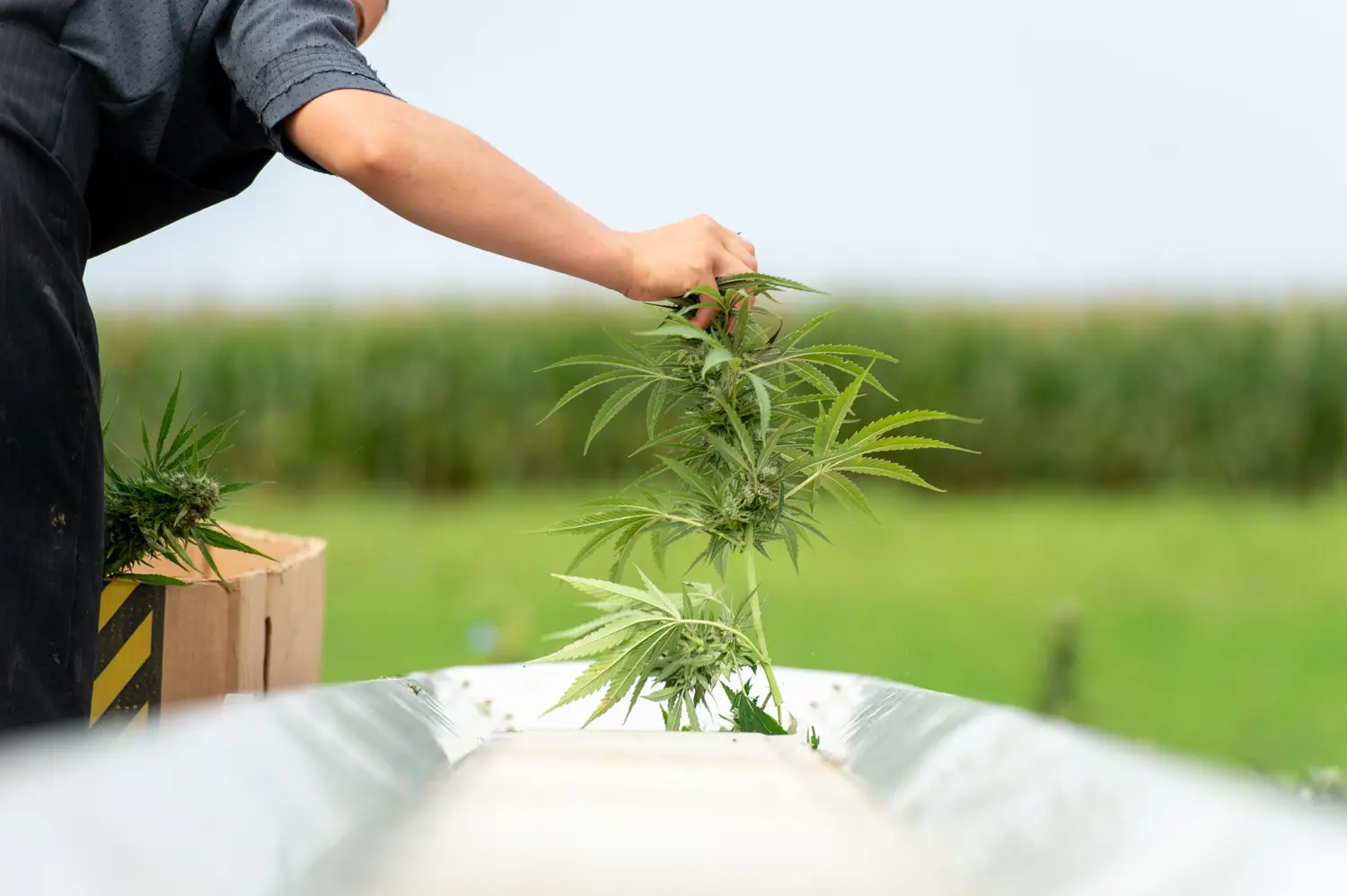Politics
New Federal Hemp Law Signed By Trump Amounts To ‘Ban Now, Ask Questions Later,’ Farmer Says (Op-Ed)

“We didn’t ban potatoes just because someone turned them into moonshine. We regulate alcohol. We should do the same with hemp.”
By Mike Simpson, Lovewell Farms via Rhode Island Current
I co-founded Lovewell Farms, Rhode Island’s only USDA-certified organic hemp farm in 2018. Since 2019, we’ve been growing legal hemp outdoors, using natural ethanol extraction and creating safe, full-spectrum CBD products like tinctures, salves and gummies—all lab-tested, adult-use only and compliant with some of the strictest regulations and THC limits in the country.
Our mission is simple: to make non-intoxicating, plant-based wellness options accessible. We’re not trying to get people high, we’re trying to help them feel better.
But last week, Congress quietly passed H.R. 5371, a government funding bill that redefines hemp so narrowly it could effectively ban most full-spectrum CBD products, even those that are non-intoxicating, naturally extracted and legally sold under state law. The bill criminalizes any product with more than 0.4 milligrams of THC or THCA, and even targets products extracted “outside the plant,” including widely used, safe methods like ethanol distillation.
What this definition ignores is botanical reality: It is virtually impossible to grow a CBD-rich hemp plant with absolutely zero THC. All cannabis plants, including federally legal hemp, naturally produce trace amounts of THC; it’s part of the plant’s chemistry. These trace levels are not enough to cause intoxication, especially when balanced by a dominant cannabinoid like CBD. Full-spectrum products rely on these naturally occurring compounds to work effectively and safely, not to get anyone high.
So, what’s the result? Tens of thousands of compliant hemp businesses, including ours, could be shut down. Not for breaking the rules, but for following them. This isn’t science-based regulation. It’s 21st-century reefer madness.
According to Reuters, the U.S. was already losing over 11,000 jobs per week as of October. Now, an additional 300,000 hemp industry jobs, from farmers to retailers to manufacturers, could disappear by 2027, threatening a $28 billion market.
Even more frustrating: while the bill includes a one-year delay on enforcement and mandates a federal study by the FDA and USDA, it still amounts to a “ban now, ask questions later” approach. Unlike here in Rhode Island, where regulators kept regulations the same while a state-led study is underway, the federal law already rewrites the definition of hemp, locking in penalties before the study is even complete.
For farmers like us, a year isn’t enough time. We make seed purchases in March, plant in April and harvest in October. If the ban takes effect in November 2026, we could be forced to destroy our entire crop at the end of next season, despite following all the rules. That’s not a transition plan, it’s a trap. At minimum, Congress should delay enforcement by 720 days to accommodate real-world timelines of agriculture.
Rhode Island’s current rules already require lab testing, child-resistant packaging, adult-only sales and labeling that mirrors the state’s medical program. Yet our attorney general, Peter Neronha, signed a letter to congressional leaders describing the entire industry as “unregulated” and “marketed to children.” That’s simply not true, is deeply misleading to the public and harms compliant, state-licensed family farms like ours. In Rhode Island, the state requires customers to prove they are 21 -years old, and meet the same exact testing, packaging, and label requirements as the regulated adult-use and medical cannabis programs.
The letter goes even further to claim that hemp-derived THC products “kill children.” In reality, only two isolated independent case reports exist linking child deaths to cannabis ingestion, and both involved illicit, unregulated products, infants and in one case, additional substances such as fentanyl and ketamine. These tragedies are not connected to regulated hemp products.
A broad ban wouldn’t prevent harm; it would push the market underground, where unregulated products are more likely to pose real risks. Responsible regulation is what keeps children and consumers safe. That’s what we already have in Rhode Island, and it works. To date, there is no record of a single cannabis-related death, of a child, infant or adult, in the state.
The letter Neronha and 38 other attorneys general signed also makes the claim that hemp-derived gummies and beverages are “designed to appeal to young children.” By that logic, the same could be said of alcoholic drinks like hard seltzers, which are often sweetened, fruit-flavored and brightly packaged. Yet alcohol wasn’t banned, likely because that industry is larger, older and has more powerful lobbyists. We didn’t ban potatoes just because someone turned them into moonshine. We regulate alcohol. We should do the same with hemp.
Despite calls from farmers and small business owners across the state, both of Rhode Island’s U.S. senators, Democrats Jack Reed and Sheldon Whitehouse, voted to keep the ban language in the bill, citing Neronha’s falsehood-ridden letter as justification. Thankfully, Rhode Island’s Democratic Reps. Seth Magaziner and Gabe Amo, both voted no on the corresponding House bill, though it still ultimately passed.
We still have time to fix this, but only if the public speaks up. The bill allows for a year before implementation. That’s one year for advocacy, education and science to lead the way. Congress should be going after bad actors, not punishing compliant small farmers who follow the law, protect public health and provide plant-based wellness alternatives to pharmaceuticals.
This isn’t a partisan issue. Lawmakers on both sides of the aisle, from progressive Democrats to conservative Republicans, have expressed concern about the impact of this hemp ban. That’s because it affects real people in every state: farmers, veterans, small business owners and families looking for natural relief. We need smart, bipartisan solutions, not rushed overreach that punishes the compliant.
We don’t need another war on cannabis. We need honest, evidence-based legislation.
Mike Simpson is the co-founder of Lovewell Farms, Rhode Island’s only U.S. Department of Agriculture (USDA) organic hemp farm. He is also a historian, educator and longtime advocate for policy reform. He was previously deputy director for Regulate Rhode Island and an initiative coordinator for Marijuana Policy Project in Maine. He now lives in Providence and farms in the village of Hope Valley in Hopkinton.
This story was first published by Rhode Island Current.
Photo courtesy of Max Jackson.



